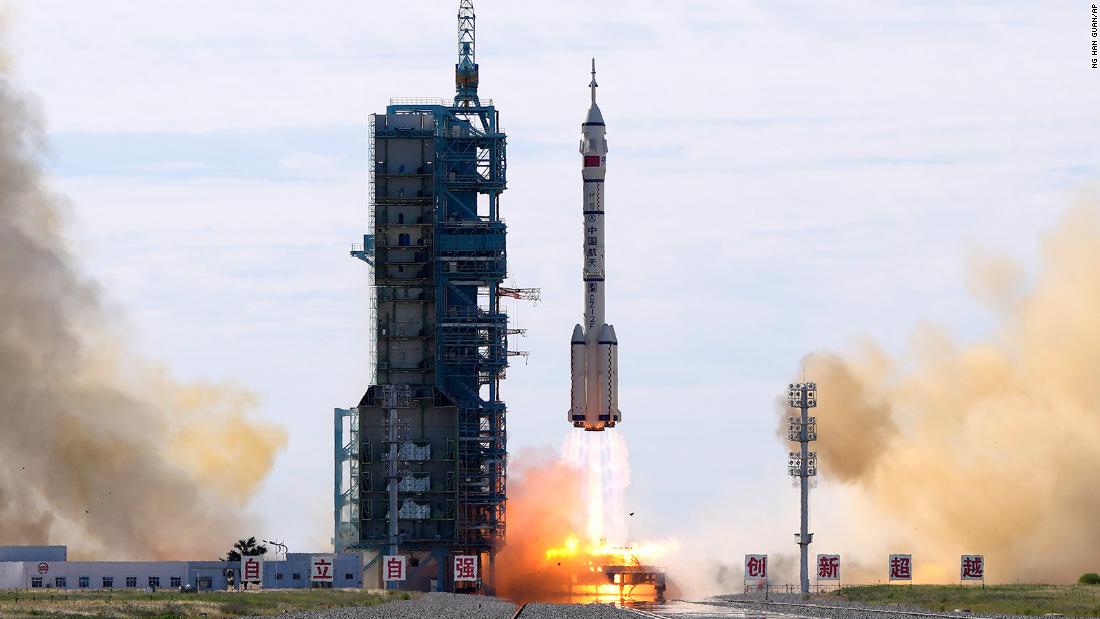The Shenzhou-12 spacecraft, or Divine Vessel, was launched on a Long March-2F carrier rocket Thursday morning, from the Jiuquan Satellite Launch Center in northwest China’s Gobi Desert.
The mission will send the crew to the core module of the planned space station, called Tiangong or Heavenly Palace, which is still under construction in a low Earth orbit.
The spacecraft will dock with the core module about six and a half hours after launch, according to state media CCTV. The crew will stay in orbit for three months, during which the life support system and maintenance will be tested.
The Shenzhou-12 mission is the first crewed mission and the third launch of a total of 11 launches for China’s space station construction. This is also China’s first manned mission in nearly five years.
During the three months, two astronauts will conduct two long-duration spacewalks. After this mission, another three crewed spacecrafts and two laboratory modules will be sent to the space station, with the aim of completing its construction by the end of 2022.
Huang Weifen, one of the chief designers on the manned space program said that during the mission the crew will be using new spacewalk suits as well as a new spacecraft. “The possibility of various problems is quite high. So for the astronauts, emergency decision-making and troubleshooting capabilities are also very high requirements,” said Huang.
The three-man crew
Recruited to the space program in 1998, Nie came close to becoming China’s first man in space. He was one of three astronauts tipped for the task, although Yang Liwei would ultimately have that honor.
Monday’s launch marks Nie’s third trip into space, having been aboard China’s first mission with more than one astronaut in 2005, and its 2013 mission to test its docking technology.
In a 2015 interview with CNN, Nie said he had named his daughter Tianxiang, which means “flying in the sky.” When Nie turned 41 — during his first mission to space — his daughter sang “happy birthday” to him from mission control.
Liu Boming, the second oldest team member, joined China’s 2008 space mission, in which he helped Zhai Zhigang become the first Chinese astronaut to conduct a spacewalk.
He is expected to play a crucial role during outside cabin operations in this mission, according to state-run Global Times.
The crew’s youngest member, Tang Hongbo, is the only one of the three yet to travel to space, despite training for 11 years, according to state media.
All three are members of the Chinese Communist Party (CCP), Global Times reported — noting that the mission’s duration coincides with the Party’s 100-year anniversary, a major national event set for July 1.
International space missions
The International Space Station (ISS) has housed more than 200 astronauts from 19 different countries — but not China.
Chinese astronauts are locked out of the ISS due to US political objections and legislative restrictions — which is why it’s been a long-standing goal for China to build a station of its own.
Russia, a longtime contributor on the ISS, has also left the project and is now considering its own space station to launch by 2030.
China’s space program has expanded rapidly in the past decade — in the last seven months alone, the country’s scientists have already successfully landed exploratory rovers on the moon in December and on Mars in May.
In April, they successfully launched the first module of the space station. The station will need to be assembled from several modules launching at different times. If successfully completed, the station is expected to operate for 10 years.
Russia’s departure from the ISS, China’s space station, and the fact that the ISS is due to run out of funding in the next few years could potentially signal an end to an unparalleled era of international cooperation in space.
But Zhou Jianping, chief designer on the country’s manned space program said Thursday that while China is not considering foreign astronaut participation at this stage of the space station’s development, non-Chinese astronauts will “certainly” be welcome into the years ahead.”There are a number of countries that have expressed a desire to do that and we will be open to that in future,” said Zhou.
CNN’s Ben Westcott and Steven Jiang contributed reporting.







More News
Chaos and Oppression
A Timeline of Weinstein’s New York Case
Maurizio Cattelan’s Got a Gun Show